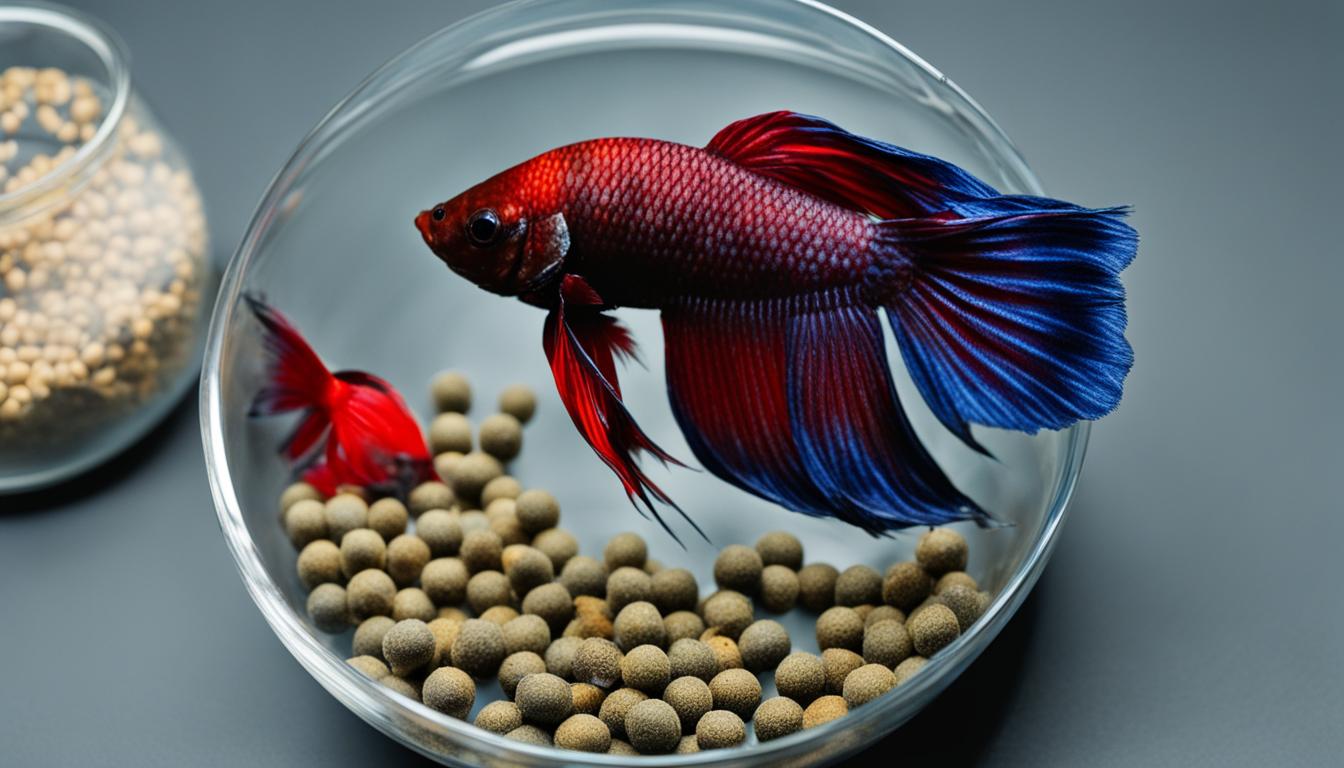Last Updated on 4 months by admin
If you’re a betta fish owner, you know how important it is to maintain their health and well-being. Overfeeding your pet fish can lead to digestive issues, bloating, and other health problems. In this comprehensive guide, we will provide you with effective methods to treat overfeeding in betta fish and help restore your pet’s health. Our approach focuses on providing caring solutions that will ensure the well-being of your beloved betta fish.
From adjusting food portions to establishing a feeding schedule and incorporating fasting days, we will cover all the necessary steps to prevent and treat overfeeding in your betta fish. By implementing these strategies, you can maintain a healthy and happy pet that thrives in its environment.
Key Takeaways:
- Overfeeding can lead to digestive issues and bloating in betta fish.
- Proper portion control and introducing fasting days can help prevent overeating.
- Selecting nutritious and digestible food options is essential for maintaining a healthy betta fish diet.
- Monitoring your betta fish’s health and behavior can help identify overfeeding-related issues.
- If your betta fish’s condition does not improve, it is advisable to seek veterinary advice.
Understanding Overfeeding in Betta Fish
Overfeeding is a common issue that betta fish owners face. While we all want to give our pets enough food, overfeeding can lead to a range of health problems. Preventing overfeeding requires establishing healthy feeding habits and understanding the reasons behind it.
When betta fish are overfed, their digestive system cannot handle the excess food, leading to bloating, constipation, swim bladder disorders, and even death. It’s essential to provide your betta fish with the right amount of food and avoid overfeeding to keep them healthy and happy.
Prevent Overfeeding with Betta Fish Healthy Feeding Habits
Preventing overfeeding is the best approach to maintain your betta fish’s health and well-being. Here are some healthy feeding habits to follow:
- Feed your betta fish twice a day, two to three pellets each time.
- Observe your betta fish while they eat to ensure they consume the food within two minutes.
- Remove any excess food from the tank to avoid overeating.
Following these feeding habits will help prevent overfeeding and maintain a healthy diet for your betta fish. Providing a balanced diet is key to ensuring your betta fish live a long and happy life.
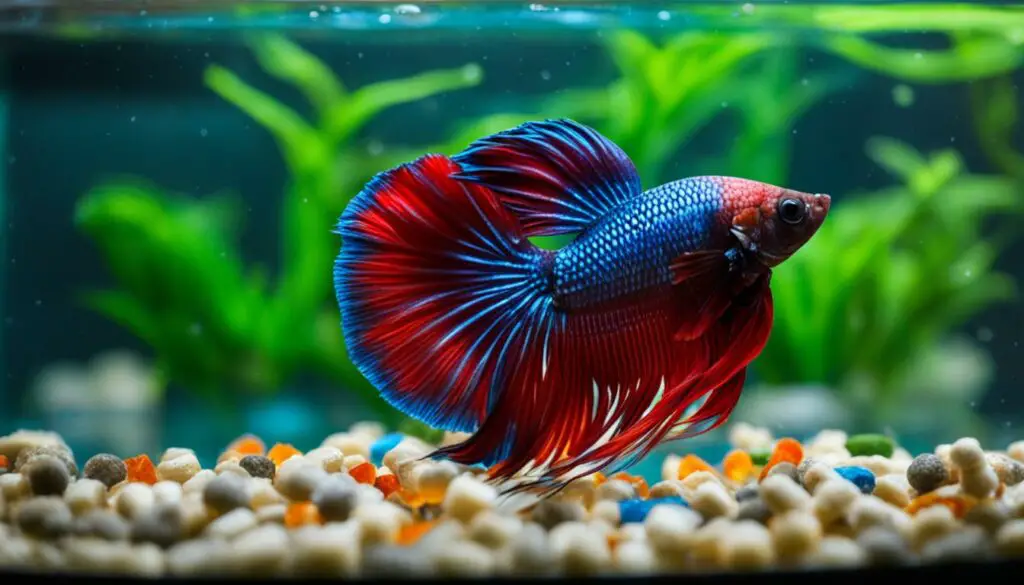
Tip: If you’re uncertain about the right feeding portion size for your betta fish, consult a veterinarian or a trusted pet store for professional advice.
Recognizing the Signs of Overfeeding
Overfeeding is a common problem among betta fish owners, which can cause various digestive issues and bloating in your pet. It’s important to recognize the signs of overfeeding to address the issue promptly and provide the necessary treatment.
Betta fish digestive issues can include constipation, swim bladder disorder, and fatty liver disease. If your betta fish is displaying any of the following symptoms, it may indicate overfeeding:
- Loss of appetite
- Bloating
- Lethargy or lack of energy
- Constipation
- Abnormal swimming behavior, such as swimming upside down or on its side
- Visible discoloration or inflammation in the abdomen area
If you notice any of these symptoms in your betta fish, it’s essential to take immediate action and provide proper treatment. Betta fish bloating treatment can include fasting, reducing food portions, or introducing digestive aids.
“Betta fish are like any other pet, and their health and well-being should be our top priority.”
It’s important to note that prevention is always better than cure. Ensure that you’re not overfeeding your betta fish, and maintain a healthy feeding habit to avoid any potential health issues. By taking care of your pet’s health, you can enjoy a long and happy life together.
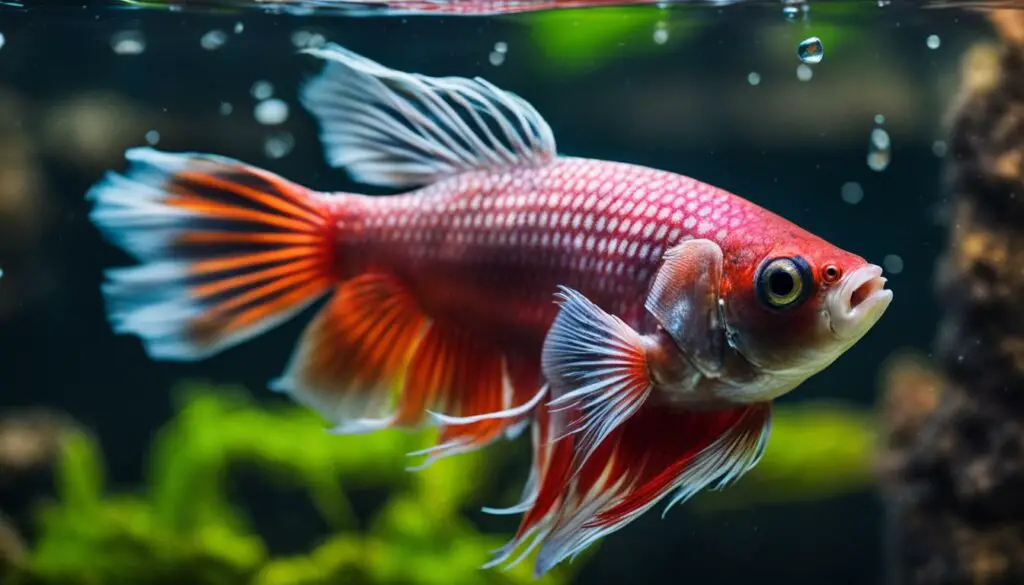
Adjusting Betta Fish Food Portion Control
Proper portion control is key to prevent overfeeding your betta fish. When feeding your betta fish, it is essential to offer the right amount of food to avoid digestive problems that can impact your pet’s health.
Here are some practical tips to help you adjust your betta fish’s food portion:
| Step | Description |
|---|---|
| Step 1 | Schedule feeding times at the same time every day. This will help your betta fish develop healthy feeding habits and prevent overeating. |
| Step 2 | Offer a small amount of food that your betta fish can consume within 2-3 minutes. A good starting point is 2-3 pellets of betta food or an amount that is approximately the size of your betta’s eye. |
| Step 3 | Observe your betta’s eating habits and adjust the portion size as necessary. If your betta fish doesn’t finish the food within the allotted time, reduce the amount next time. On the other hand, if your betta fish finishes the food quickly, you can increase the portion size slightly. |
Remember, it’s better to underfeed your betta fish than overfeed them. Overfeeding can cause digestive issues, bloating, and other health problems that can be challenging to treat. By following these portion control tips, you can help prevent overfeeding and provide your betta fish with the right amount of food to maintain their health and well-being.
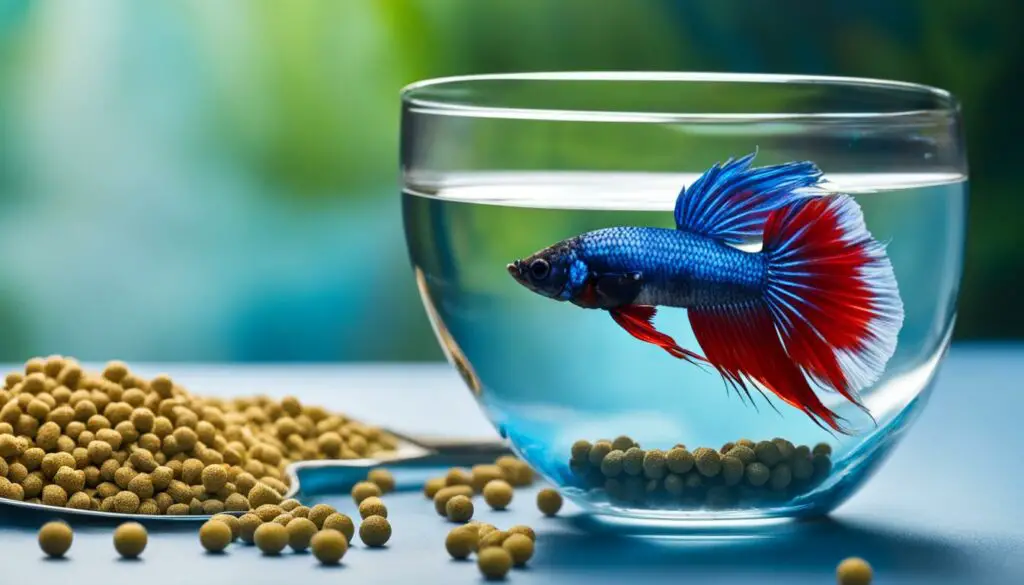
Introducing Feeding Schedule and Frequency
Establishing a feeding schedule and frequency is crucial for preventing overfeeding in betta fish and promoting healthy feeding habits.
When determining a feeding schedule for your betta fish, consider their age, size, and activity level. Adult betta fish typically require feeding once or twice a day, while younger betta fish may need to be fed more frequently.
It’s also important to note that betta fish can go for a few days without food, so occasional fasting days can be beneficial in regulating their digestion and preventing overeating.
A balanced feeding routine should consist of a variety of nutritious and digestible food options, such as pellets, frozen or live food, and vegetables. However, always ensure that the food you offer is appropriate for your betta fish and avoid overfeeding.
Example of a Feeding Schedule for a Healthy Betta Fish
| Day | Feeding |
|---|---|
| Monday | 1-2 pellets in the morning, 1-2 pellets in the evening |
| Tuesday | Frozen or live food in the morning, fasting in the evening |
| Wednesday | 1-2 pellets in the morning, 1-2 pellets in the evening |
| Thursday | Vegetable in the morning, fasting in the evening |
| Friday | 1-2 pellets in the morning, frozen or live food in the evening |
| Saturday | 1-2 pellets in the morning, 1-2 pellets in the evening |
| Sunday | Fasting for the whole day |
Remember, a healthy feeding routine should focus on preventing overfeeding and promoting the overall well-being of your betta fish. By incorporating the strategies discussed in this guide, you can ensure your betta fish stay healthy and happy.
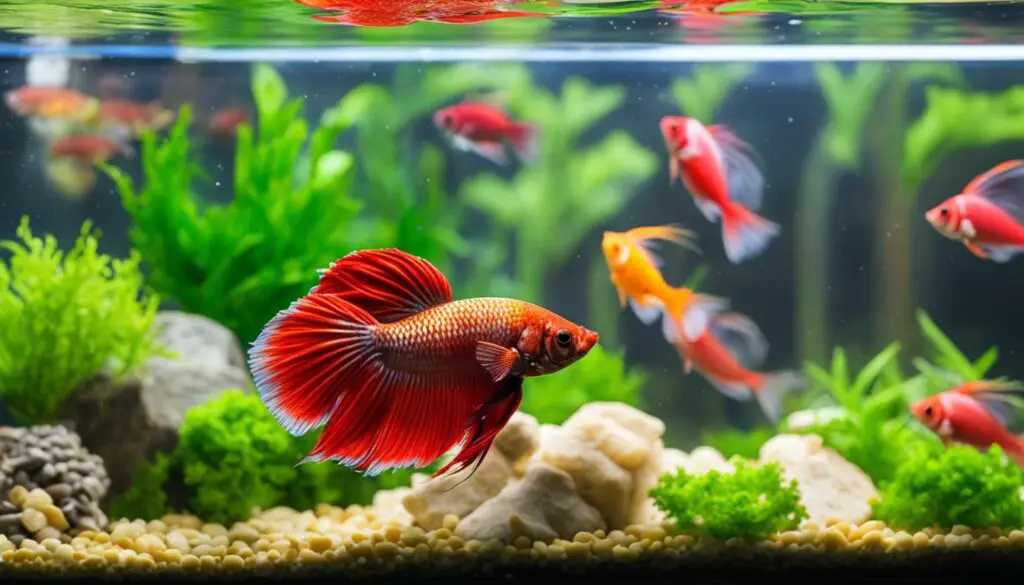
Opting for Nutritious and Digestible Food
When it comes to preventing overfeeding in betta fish, offering nutritious and digestible food is essential to maintaining healthy feeding habits.
Betta fish require a balanced diet of protein, fats, and fiber to maintain optimal health. While commercially available fish food pellets are a convenient option, it’s important to ensure that they contain high-quality ingredients.
“Look for fish food pellets that are rich in protein and contain limited quantities of fillers and artificial preservatives,” advises Dr. Sarah Johnson, a veterinarian specializing in aquatic animals.
Another option is to offer live or frozen food, such as brine shrimp, daphnia, or bloodworms. Live or frozen food is a more natural option for betta fish, but it’s important to ensure that it’s from a reputable source and free of any harmful parasites or bacteria.
In addition to selecting nutritious food, it’s crucial to ensure that it’s easily digestible for betta fish. Avoid offering food that is too large or hard to digest, as it can cause digestive issues such as constipation or bloating.
To ensure that your betta fish are receiving the proper nutrition without overeating, it’s recommended to follow the portion control guidelines outlined in Section 4 and offer a balanced diet of various food options.
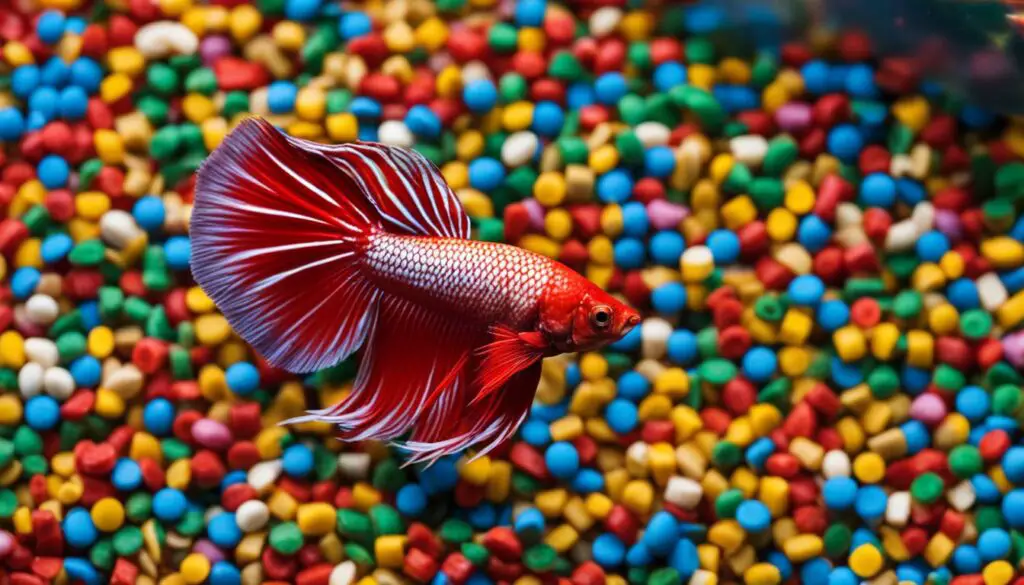
Tips for selecting nutritious and digestible food for betta fish:
| Nutritious Food | Digestible Food |
|---|---|
| High-quality fish food pellets rich in protein. | Small food portions that are easy to digest, such as live or frozen brine shrimp, daphnia or bloodworms. |
| Fresh and organic vegetables such as spinach, peas, or zucchini. | Softened or boiled vegetables to make them easier to digest. |
| Treats such as freeze-dried krill or plankton. | Grind or break up larger treats for easier digestion. |
Implementing Fasting Days for Betta Fish
One of the most effective ways to prevent overfeeding and treat betta fish overeating is to incorporate fasting days into their feeding routine. Fasting allows your betta’s digestive system to rest and promotes a healthy appetite. As with any dietary changes, it’s essential to start slowly and increase gradually.
To begin with, try skipping one feeding day per week. If your betta adjusts well, you can gradually increase the fasting period to two or three days per week. It’s crucial to monitor your betta fish’s behavior during fasting days to ensure they are not exhibiting any signs of distress or starvation.
If your betta fish experiences bloating or digestive issues, fasting can provide relief and help regulate their digestion. However, it’s crucial to ensure they have access to clean and suitable water during fasting to avoid any health complications.
Here’s an example of a feeding schedule that incorporates fasting:
| Day | Feeding Schedule |
|---|---|
| Monday | Feed once in the morning and once in the evening |
| Tuesday | Skip a feeding day |
| Wednesday | Feed once in the morning |
| Thursday | Feed once in the evening |
| Friday | Skip a feeding day |
| Saturday | Feed once in the morning and once in the evening |
| Sunday | Skip a feeding day |
Remember that each betta fish is unique, and their dietary needs may differ. Always observe your betta fish’s behavior and adjust the feeding routine accordingly. By incorporating fasting days and establishing healthy feeding habits, you can prevent overfeeding and ensure your betta fish’s well-being.
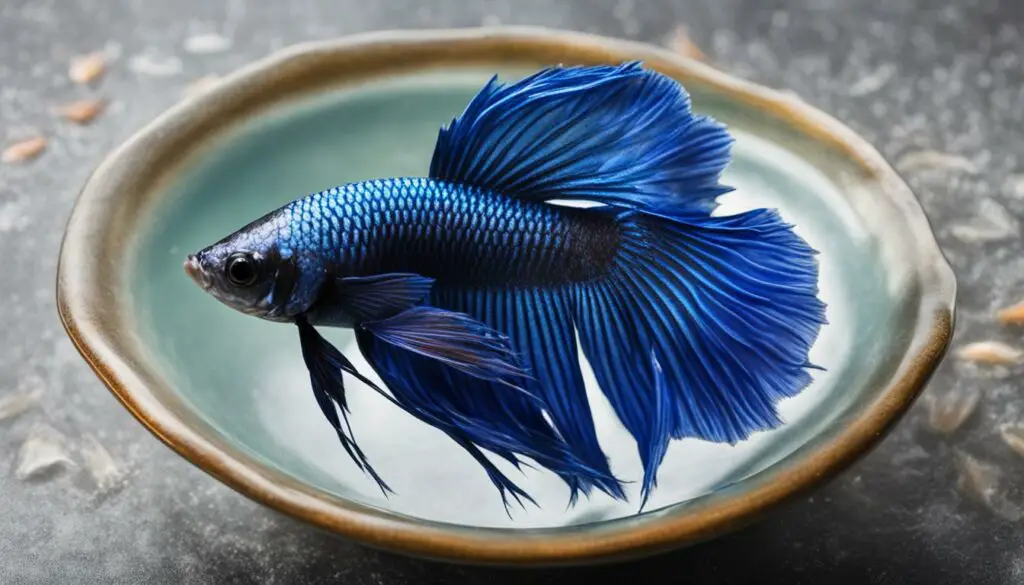
Enhancing Betta Fish Tank Environment
Creating a suitable environment in the betta fish tank is crucial in preventing overfeeding. Betta fish need not only a clean tank but also a stimulating environment that encourages healthy feeding habits. Here are some tips to enhance your betta fish’s tank environment:
- Avoid Overcrowding: Overcrowding can cause stress and aggression in betta fish, leading to digestive issues and overeating. Ensure your betta fish have enough space to move around freely.
- Provide Hiding Spots: Betta fish love to hide and explore. Adding plants, rocks, and other décor provides a stimulating environment while allowing them to hide when feeling anxious.
- Maintain Clean Water: Regular water changes and tank cleaning prevent the buildup of harmful bacteria and ensure your betta fish’s digestive health. Check water temperature regularly as well, as betta fish need warm water to thrive.
- Offer Variety: Betta fish enjoy playing with toys and interacting with live food. Providing a variety of food options and toys helps keep your betta fish active and happy.
Betta fish are active and curious creatures that require a stimulating and engaging environment to remain healthy and happy. By following these tips, you can prevent overfeeding and ensure your betta fish’s healthy feeding habits.
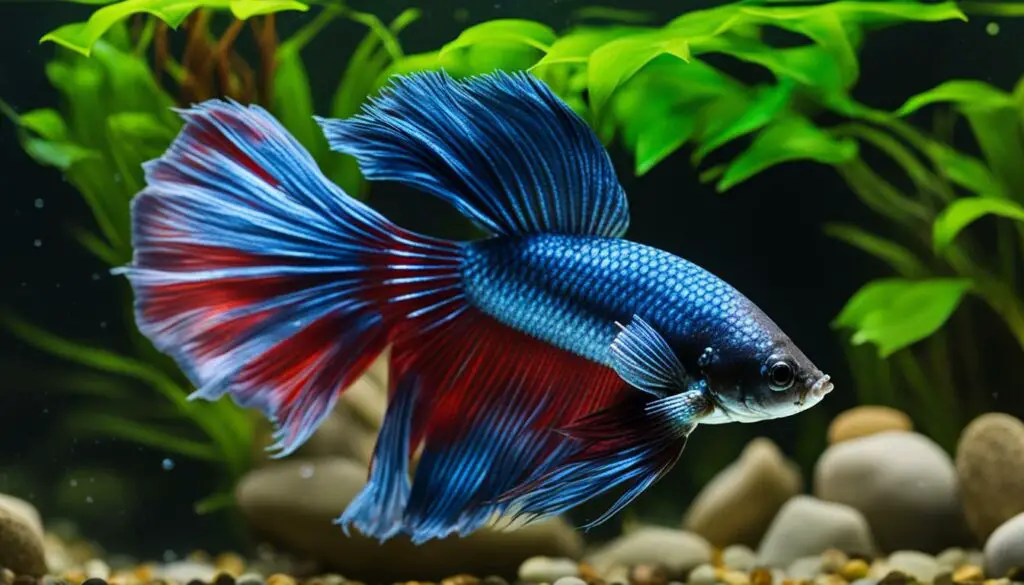
Monitoring Betta Fish’s Health and Behavior
Regularly monitoring your betta fish’s health and behavior is crucial in ensuring their well-being and detecting any potential issues related to overfeeding. Here are some signs to look out for:
- Decreased appetite
- Lethargy or sluggishness
- Gasping at the water’s surface
- Bloating or swelling of the abdomen
If you notice any of these symptoms, it is important to take action promptly. One effective betta fish bloating treatment is to fast them for a day or two, allowing their digestive system to reset and recover. If the symptoms persist, you may need to seek additional treatment or consult with a veterinarian.
Moreover, maintaining a clean and stimulating environment in your betta fish tank can also contribute to preventing overfeeding and promoting healthy feeding habits. Ensure that the water quality is optimal, and the tank is free from debris. Consider providing your betta fish with toys and other suitable decorations to encourage exercise and activity. All these measures can help ensure your pet’s health and well-being.
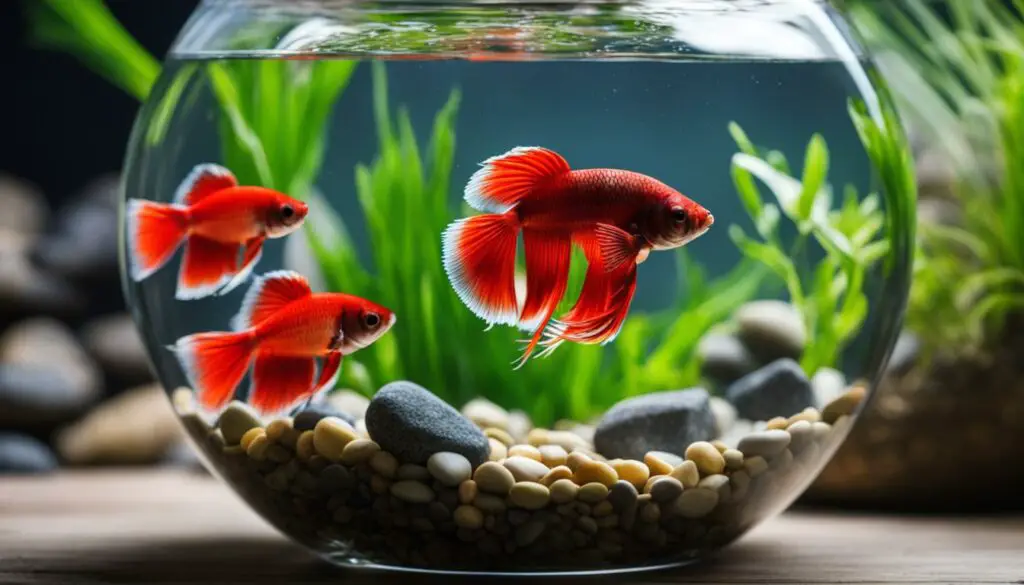
“A healthy betta fish is a happy fish, and monitoring your pet’s health and behavior is a crucial aspect of ensuring their well-being.”
Seeking Veterinary Advice
If you have tried several betta fish overfeeding remedies and solutions, and your beloved pet still experiences health issues, it is crucial to seek veterinary advice. A veterinarian can help diagnose the underlying cause of the problem and prescribe appropriate treatment to restore your betta fish’s health.
Make sure to share your betta fish’s entire feeding history with the veterinarian, including any recent changes, to help them determine the root cause of the problem. The veterinarian may also conduct some tests to assess your pet’s overall health.
Do not hesitate to seek veterinary help, especially if your betta fish experiences severe symptoms such as bloating, constipation, or loss of appetite.
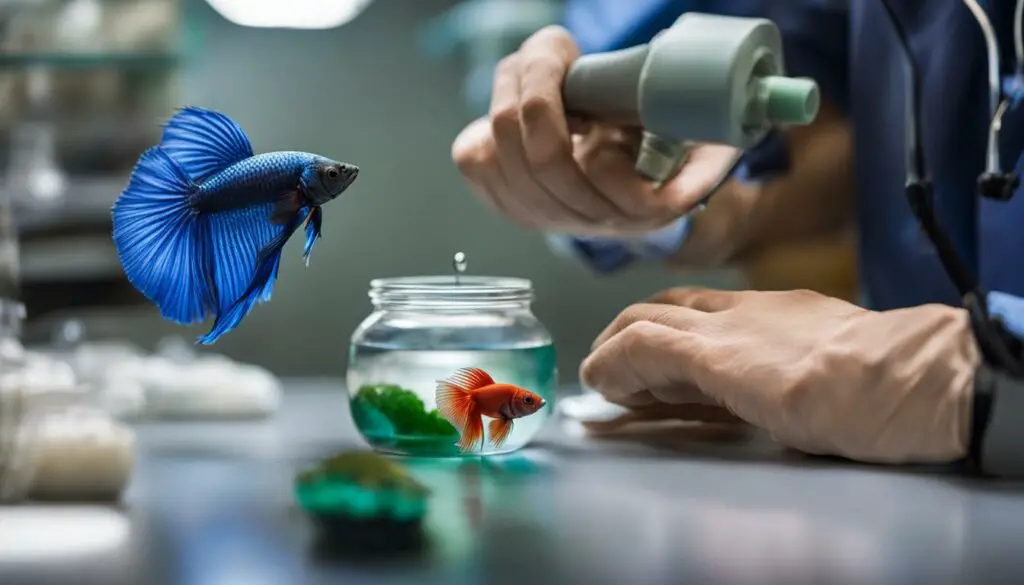
Remember, your betta fish’s health and well-being should always be a top priority. Seeking professional assistance from a veterinarian can help ensure your pet’s long and healthy life.
Conclusion
Congratulations on taking the first step towards treating overfeeding in your betta fish and restoring their health. Remember, prevention is key, and establishing healthy feeding habits is crucial to avoiding overfeeding-related issues. By adjusting food portion control, introducing a feeding schedule, opting for nutritious and digestible food, implementing fasting days, and maintaining a clean and stimulating tank environment, you can ensure the well-being of your beloved betta fish.
However, if your betta fish continues to exhibit signs of overfeeding despite your efforts, do not hesitate to seek veterinary advice. Sometimes, professional assistance is necessary to address overfeeding-related issues effectively. By following the strategies outlined in this guide and monitoring your betta fish’s health and behavior regularly, you can provide a caring environment for your pet and maintain their happiness and well-being.
FAQ
How can I treat overfeeding in betta fish and restore my pet’s health in a caring way?
There are several effective methods to treat overfeeding in betta fish and restore their health. These include adjusting their food portion control, establishing a feeding schedule and frequency, opting for nutritious and digestible food, implementing fasting days, creating a suitable tank environment, monitoring their health and behavior, and seeking veterinary advice if necessary.
Why does overfeeding occur in betta fish and how can I prevent it?
Overfeeding in betta fish can occur due to a lack of portion control or feeding habits. To prevent overfeeding, it is important to establish healthy feeding habits, such as providing the right portion size and feeding schedule. By avoiding overfeeding, you can protect your betta fish’s health and well-being.
How can I recognize the signs of overfeeding in my betta fish?
Common signs of overfeeding in betta fish include bloating, constipation, lethargy, loss of appetite, and abnormal behavior. It is important to monitor your betta fish’s health and behavior closely to identify any potential signs of overfeeding and provide the necessary treatment.
How do I adjust betta fish food portion control?
Adjusting betta fish food portion control involves providing the right amount of food to prevent overeating. It is recommended to feed your betta fish small, frequent meals rather than one large meal. Monitoring their eating habits and adjusting the portion size accordingly can help maintain the optimal food intake for your betta fish.
How do I establish a feeding schedule and frequency for my betta fish?
Establishing a feeding schedule and frequency for your betta fish involves creating a balanced feeding routine. It is recommended to feed them 2-3 small meals per day, taking into account their size, age, and activity level. Consistency is key in establishing a regular feeding schedule that promotes their overall health.
What type of food should I offer my betta fish to prevent overfeeding?
Opting for nutritious and digestible food is essential in preventing overfeeding. High-quality betta fish pellets or flakes that are specifically formulated for betta fish provide the necessary nutrients while minimizing the risk of overeating. Avoid feeding them live or freeze-dried food excessively, as these can be more difficult to digest.
How can fasting days help prevent overfeeding in betta fish?
Incorporating fasting days into your betta fish’s feeding routine can help regulate their digestion and prevent overeating. On fasting days, simply refrain from feeding them to allow their digestive system to rest. Fasting days can be scheduled once or twice a week, depending on your betta fish’s age and size.
How does the betta fish tank environment affect overfeeding?
Creating a suitable environment in the betta fish tank plays a crucial role in preventing overfeeding. A clean and stimulating tank environment encourages betta fish to exhibit natural feeding behaviors. By providing a well-maintained tank with appropriate hiding spots and decorations, you can promote healthy feeding habits and reduce the risk of overeating.
What should I monitor in my betta fish’s health and behavior to identify overfeeding issues?
Regularly monitoring your betta fish’s health and behavior can help identify potential issues related to overfeeding. Look out for signs of bloating, constipation, loss of appetite, lethargy, and abnormal swimming patterns. If you notice any of these signs, it is important to take appropriate action and provide the necessary bloating treatment and address any digestive issues.
When should I seek veterinary advice for my betta fish’s overfeeding issues?
If you have tried various treatments and your betta fish’s condition does not improve, it is advisable to seek veterinary advice. A veterinarian specializing in exotic fish can provide professional assistance, diagnose any underlying health issues, and recommend specific betta fish overfeeding remedies or solutions to resolve the problem effectively.

